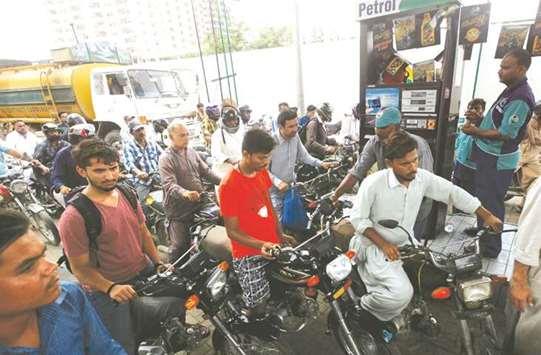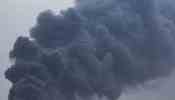
403
Sorry!!
Error! We're sorry, but the page you were looking for doesn't exist.
Petrol sales rise despite cheaper CNG in Pakistan
(MENAFN- Gulf Times) Despite being a clean and cheaper source of energy, compressed natural gas (CNG) has been unable to beat the use of petrol in Pakistan, which continues to post sale and import records.
Petrol imports hit a record high of 549,968 tonnes in September while its sales stood at 642,000 tonnes.
Petrol sales reached their peak of 684,440 tonnes in August.
In October, petrol imports were 447,128 tonnes while sales stood at 595,000 tonnes, an official of the Oil Companies Advisory Council (OCAC) said.
Petrol off-take has been surging owing to rising sales of two- and four-wheelers.
Imports of used cars of mostly small engine power are also boosting petrol demand.
Petrol sales may remain robust in coming years following the arrival of car assemblers from South Korea and China and the planned rollout of new models by existing automakers.
According to the OCAC official, petrol demand is likely to cross 9mn tonnes by 2020-21.
Amid growing petrol sales, CNG station owners claim that their fuel still costs less than petrol.
Yet consumers seem to prefer petrol to CNG because of various reasons.
The official in charge of the All Pakistan CNG Association (APCNGA) Sindh Zone, Shabbir Sulemanji, said the consumption of CNG in the province has declined to 80mn cubic feet per day (mmcfd) from 85mmcfd last year.
People shifted to petrol without realising that CNG offers higher savings, he said.
'CNG still costs 30-32 per cent less than petrol, he said.
The petrol price went up by Rs2.49 per litre on November 1.
He added that the saving level would further rise in case petrol became costlier.
Consumers in Sindh have witnessed a jump of over Rs10 per kilo in the CNG rate since December 2016 when its price was de-regularised.
Its price in Sindh hovers around Rs77-78 per kg.
APCNGA former chairman Ghayas Paracha said using CNG costs 28% less than using petrol.
In Punjab, the CNG price hovers around Rs53-55 per litre.
The use of CNG in Punjab touched the peak of 200mmcfd in 2011-12 when almost 2,400 pumps were operational.
Its consumption declined to 9mmcfd in the first half of 2015.
After the introduction of re-gasified liquefied natural gas (RLNG) in June 2015, the consumption of CNG in Punjab increased and now it hovers around 70mmcfd, he said.
Currently, 900 of 2,400 CNG outlets in Punjab are in operation.
But they have been witnessing only 3-4% growth in sales for the last three to four months, Paracha said.
He claimed that one of the reasons for heavy smog in Punjab was the falling use of CNG.
Only 900,000 vehicles, including ones used in public transport, now run on CNG against the 2013 estimate of 3.7mn vehicles.
He said Khyber Pakhtunkhwa has 537 CNG stations, which consume 81mmcfd of gas.
Baluchistan has 25 CNG stations where 3mmcfd of gas is used.
He said the introduction of electronic fuel injection (EFI) engines in imported and locally assembled cars in the last eight years has also encouraged vehicle owners to use petrol.
'Petrol sales are still going strong in Punjab despite cheaper CNG, he said, adding that the CNG body is in talks with the government to allow the import of new technology kits that will push up CNG savings by 10%.
The CNG association has also requested the government to allow cylinders with a capacity of 32kg instead of 55kg.
New kits and cylinder imports will be for EFI car engines.
Due to the improved supply of CNG in Punjab, Pakistan's LNG imports in July- September swelled to $397mn from $253mn a year ago.
Total LNG imports hit $1.3bn in 2016-17 against $567mn in 2015-16.
The country's total car sales were 50,640 units in the first quarter of the current fiscal year, up from 41,405 units a year ago.
Total car sales in 2016-17 surged to 185,781 units from 118,830 units in 2013-14, according to the Pakistan Automotive Manufacturers Association.
Pakistan's total local bike production reached 2.4mn units in 2016-17 from 2.1mn units in 2015-16, figures compiled by the Engineering Development Board show.
Bike dealers believe two-wheelers consume over 60% of total petrol used in the country.
Petrol imports hit a record high of 549,968 tonnes in September while its sales stood at 642,000 tonnes.
Petrol sales reached their peak of 684,440 tonnes in August.
In October, petrol imports were 447,128 tonnes while sales stood at 595,000 tonnes, an official of the Oil Companies Advisory Council (OCAC) said.
Petrol off-take has been surging owing to rising sales of two- and four-wheelers.
Imports of used cars of mostly small engine power are also boosting petrol demand.
Petrol sales may remain robust in coming years following the arrival of car assemblers from South Korea and China and the planned rollout of new models by existing automakers.
According to the OCAC official, petrol demand is likely to cross 9mn tonnes by 2020-21.
Amid growing petrol sales, CNG station owners claim that their fuel still costs less than petrol.
Yet consumers seem to prefer petrol to CNG because of various reasons.
The official in charge of the All Pakistan CNG Association (APCNGA) Sindh Zone, Shabbir Sulemanji, said the consumption of CNG in the province has declined to 80mn cubic feet per day (mmcfd) from 85mmcfd last year.
People shifted to petrol without realising that CNG offers higher savings, he said.
'CNG still costs 30-32 per cent less than petrol, he said.
The petrol price went up by Rs2.49 per litre on November 1.
He added that the saving level would further rise in case petrol became costlier.
Consumers in Sindh have witnessed a jump of over Rs10 per kilo in the CNG rate since December 2016 when its price was de-regularised.
Its price in Sindh hovers around Rs77-78 per kg.
APCNGA former chairman Ghayas Paracha said using CNG costs 28% less than using petrol.
In Punjab, the CNG price hovers around Rs53-55 per litre.
The use of CNG in Punjab touched the peak of 200mmcfd in 2011-12 when almost 2,400 pumps were operational.
Its consumption declined to 9mmcfd in the first half of 2015.
After the introduction of re-gasified liquefied natural gas (RLNG) in June 2015, the consumption of CNG in Punjab increased and now it hovers around 70mmcfd, he said.
Currently, 900 of 2,400 CNG outlets in Punjab are in operation.
But they have been witnessing only 3-4% growth in sales for the last three to four months, Paracha said.
He claimed that one of the reasons for heavy smog in Punjab was the falling use of CNG.
Only 900,000 vehicles, including ones used in public transport, now run on CNG against the 2013 estimate of 3.7mn vehicles.
He said Khyber Pakhtunkhwa has 537 CNG stations, which consume 81mmcfd of gas.
Baluchistan has 25 CNG stations where 3mmcfd of gas is used.
He said the introduction of electronic fuel injection (EFI) engines in imported and locally assembled cars in the last eight years has also encouraged vehicle owners to use petrol.
'Petrol sales are still going strong in Punjab despite cheaper CNG, he said, adding that the CNG body is in talks with the government to allow the import of new technology kits that will push up CNG savings by 10%.
The CNG association has also requested the government to allow cylinders with a capacity of 32kg instead of 55kg.
New kits and cylinder imports will be for EFI car engines.
Due to the improved supply of CNG in Punjab, Pakistan's LNG imports in July- September swelled to $397mn from $253mn a year ago.
Total LNG imports hit $1.3bn in 2016-17 against $567mn in 2015-16.
The country's total car sales were 50,640 units in the first quarter of the current fiscal year, up from 41,405 units a year ago.
Total car sales in 2016-17 surged to 185,781 units from 118,830 units in 2013-14, according to the Pakistan Automotive Manufacturers Association.
Pakistan's total local bike production reached 2.4mn units in 2016-17 from 2.1mn units in 2015-16, figures compiled by the Engineering Development Board show.
Bike dealers believe two-wheelers consume over 60% of total petrol used in the country.

Legal Disclaimer:
MENAFN provides the
information “as is” without warranty of any kind. We do not accept
any responsibility or liability for the accuracy, content, images,
videos, licenses, completeness, legality, or reliability of the information
contained in this article. If you have any complaints or copyright
issues related to this article, kindly contact the provider above.






















Comments
No comment